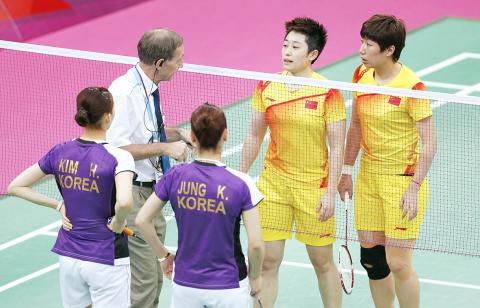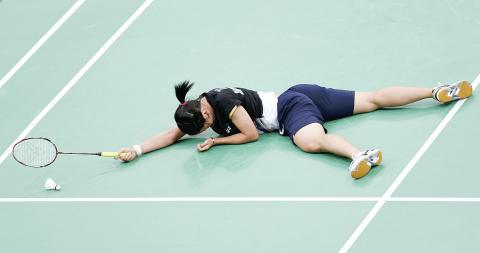Eight female badminton doubles players were disqualified from the London Olympics yesterday after trying to lose matches to receive a more favorable place in the tournament.
The Badminton World Federation (BWF) announced its ruling after investigating two duos from South Korea and one each from China and Indonesia. It punished them for “not using one’s best efforts to win a match” and “conducting oneself in a manner that is clearly abusive or detrimental to the sport” in matches on Tuesday night.
“We applaud the federation for having taken swift and decisive action,” International Olympic Committee (IOC) spokesman Mark Adams said. “Such behavior is incompatible with the Olympic values.”

Photo: Reuters
Erick Thohir, the head of Indonesia’s Olympic team, said the Indonesian team would appeal. The BWF said South Korea had also appealed.
The competition was to continue later yesterday. It was unclear if the four eliminated pairs would be placed into the quarter-finals or if the competition would restart at the semi-final stage.
Thohir accused Chinese players of losing on purpose in the past.

Photo: Reuters
“China has been doing this so many times and they never get sanctioned by the BWF,” Thohir said. “On the first game yesterday when China did it, the BWF didn’t do anything. If the BWF do something on the first game and they say you are disqualified, it is a warning for everyone.”
IOC vice president Craig Reedie, the former head of the badminton federation, welcomed the decision.
“Sport is competitive,” Reedie said. “If you lose the competitive element, then the whole thing becomes a nonsense. You cannot allow a player to abuse the tournament like that and not take firm action. So good on them.”
The eight disqualified badminton players were world doubles champions Wang Xiaoli (王曉理) and Yu Yang (于洋) of China, their South Korean opponents Jung Kyun-eun and Kim Ha-na, South Korea’s Ha Jung-eun and Kim Min-jung, and Indonesia’s Meiliana Jauhari and Greysia Polii.
The players went before a disciplinary hearing yesterday, a day after spectators at the arena booed their performance after it became clear they were deliberately trying to lose.
International Olympic Committee president Jacques Rogge had been at the venue, but had left shortly before the drama unfolded. The IOC said it would allow badminton’s ruling body to handle the matter.
Paul Deighton, chief executive officer of the London organizers, said there would be no refunds for the evening’s badminton program. Chairman Sebastian Coe called what happened “depressing,” adding: “Who wants to sit through something like that?”
Teams blamed the introduction of a round-robin stage rather than a straight knockout tournament as the main cause of the problem. In the round-robin format, losing one game can lead to an easier matchup in the next round.
The Chinese players were accused of leading the way by deliberately losing a game. This led to other teams behaving in a similar way to try to force an easier quarter-final. At one stage, both teams appeared to be trying to lose.
Wang, Yu and their opponents were booed loudly by the crowd after dumping serves into the net and making simple errors, such as hitting the shuttlecock wide.
The longest rally in their first game was only four strokes. The umpire warned them and tournament referee Torsten Berg spoke to all four players, but it had little effect. At one stage, Berg showed a black card, which usually means disqualification, but the game continued.
Eventually, the Chinese women lost 21-14, 21-11 and both pairs were jeered off the court.
One of the world’s top male players, 2004 Olympic singles champion Taufik Hidayat of Indonesia, called the situation a “circus match.”
The teams had already qualified for the knockout round, but the result ensured that top seeds Wang and Yu would have avoided playing their second-seeded Chinese teammates until the final.
The problem was repeated in the next women’s doubles match between South Korea’s Ha and Kim Min-jung and their Indonesian opponents. Both teams were also warned for deliberately losing points in a match the South Koreans won 18-21, 21-14, 21-12.
China’s Lin Dan, the world No. 2 men’s singles player, said through an interpreter the sport is going to be damaged.
“Especially for the audience,” he said before the disqualifications were announced. “This is definitely not within the Olympic spirit, but like I said before, it’s not one-sided. Whoever sets the rule should make it knockout, so whoever doesn’t try will just leave the Olympics.”
Beijing badminton silver medalist Gail Emms said the games had been embarrassing to watch and that the players could be thrown out of the tournament.
“It was absolutely shocking,” she said. “The crowds were booing and chanting: ‘Off, off, off.’ This is London 2012. For the future of our sport and the Olympic Games something needs to be done.”
Meanwhile in the women’s singles competition yesterday, Taiwan’s Tai Tzu-ying (戴資穎) put pressure on one of the favorites to win gold, but ultimately fell short in their round-of-16 match.
Tai, seeded 10th, lost to third seed Li Xueru (李雪芮) of China 21-16, 23-21 after saving five match points. The Taiwanese 18-year-old was within a point at 7-6 in the first game when Li ran up five straight points and eight of the next 10 to move ahead 15-8.
Tai pulled to within two at 18-16, but could get no closer. In a tightly fought second game Tai seemed to have the momentum when she took a 15-12 lead, but the more patient and consistent Li went on an 8-0 run to give her five match points.
Tai suddenly stepped up her game and saved them all, even giving herself a set point, only to squander it by misplaying a shot that barely cleared the net.
The Chinese 21-year-old then ran off the next two points, putting the match away with a smash that fell out of Tai’s reach.
Later yesterday in the women’s singles, Taiwan’s Cheng Shao-chieh defeated Gu Juan of Singapore 21-18, 21-10 to reach the quarter-finals.
Additional reporting by staff writer, with CNA

The US government has signed defense cooperation agreements with Japan and the Philippines to boost the deterrence capabilities of countries in the first island chain, a report by the National Security Bureau (NSB) showed. The main countries on the first island chain include the two nations and Taiwan. The bureau is to present the report at a meeting of the legislature’s Foreign Affairs and National Defense Committee tomorrow. The US military has deployed Typhon missile systems to Japan’s Yamaguchi Prefecture and Zambales province in the Philippines during their joint military exercises. It has also installed NMESIS anti-ship systems in Japan’s Okinawa

‘WIN-WIN’: The Philippines, and central and eastern European countries are important potential drone cooperation partners, Minister of Foreign Affairs Lin Chia-lung said Minister of Foreign Affairs Lin Chia-lung (林佳龍) in an interview published yesterday confirmed that there are joint ventures between Taiwan and Poland in the drone industry. Lin made the remark in an exclusive interview with the Chinese-language Liberty Times (the Taipei Times’ sister paper). The government-backed Taiwan Excellence Drone International Business Opportunities Alliance and the Polish Chamber of Unmanned Systems on Wednesday last week signed a memorandum of understanding in Poland to develop a “non-China” supply chain for drones and work together on key technologies. Asked if Taiwan prioritized Poland among central and eastern European countries in drone collaboration, Lin

TRAGEDY STRIKES TAIPEI: The suspect died after falling off a building after he threw smoke grenades into Taipei Main Station and went on a killing spree in Zhongshan A 27-year-old suspect allegedly threw smoke grenades in Taipei Main Station and then proceeded to Zhongshan MRT Station in a random killing spree that resulted in the death of the suspect and two other civilians, and seven injured, including one in critical condition, as of press time last night. The suspect, identified as a man surnamed Chang Wen (張文), allegedly began the attack at Taipei Main Station, the Taipei Fire Department said, adding that it received a report at 5:24pm that smoke grenades had been thrown in the station. One man in his 50s was rushed to hospital after a cardiac arrest

ON ALERT: Taiwan’s partners would issue warnings if China attempted to use Interpol to target Taiwanese, and the global body has mechanisms to prevent it, an official said China has stationed two to four people specializing in Taiwan affairs at its embassies in several democratic countries to monitor and harass Taiwanese, actions that the host nations would not tolerate, National Security Bureau (NSB) Director-General Tsai Ming-yen (蔡明彥) said yesterday. Tsai made the comments at a meeting of the legislature’s Foreign Affairs and National Defense Committee, which asked him and Minister of National Defense Wellington Koo (顧立雄) to report on potential conflicts in the Taiwan Strait and military preparedness. Democratic Progressive Party (DPP) Legislator Michelle Lin (林楚茵) expressed concern that Beijing has posted personnel from China’s Taiwan Affairs Office to its